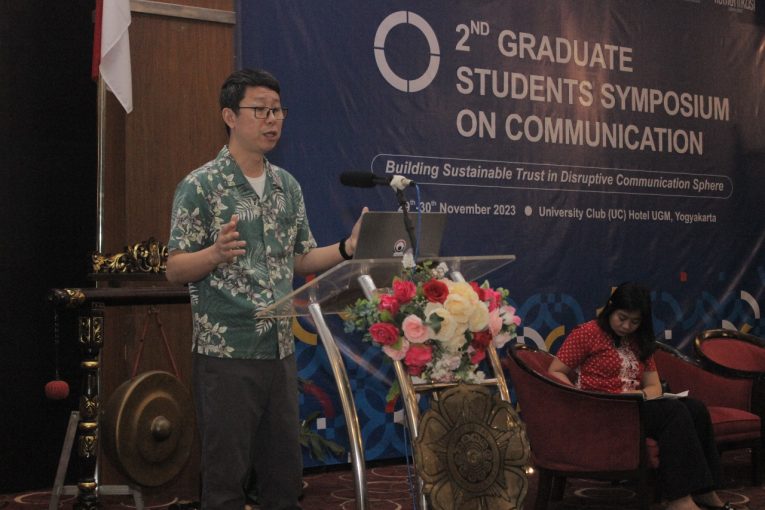
Yogyakarta, November 29th 2023─The impact of technological disruption and the development of digital media, especially in the post-Covid-19 pandemic, has created significant changes in the public space. These changes do not only occur in the space of human interaction, but also disrupt the trust that exists between various entities in the public space. Responding to these changes, the Communication Masters Study Program at Faculty of Social and Political Sciences UGM again held its second Graduate Symposium on Communication (GSSC) on Wednesday to Thursday (29-30/11) at the University Club Hotel UGM with the theme “Building Sustainable Trust in the Disruptive Communication Sphere”.
“Faculty of Social and Political Sciences UGM is very grateful for this conference. We hope, this event can bring new analysis and perspectives, also can develop new agendas,” said Wawan Mas’udi, Dean of Fisipol UGM, when giving a speech at the opening ceremony. In line with Wawan, Mufti Nur Latifah, chairman of the GSSC committee, said that there were two main objectives of the event, “Our first objective is to recognize the research efforts that have been carried out regarding the issue of trust in an increasingly disrupted communications environment. Second, to spark discussion and innovative ideas related to encouraging and establishing trust in a digital society,” said Mufti.
Present at the event, Jack Qiu Linchuan from Wee Kim Wee School of Communication and Information, Nanyang Technological University, as the keynote speaker. Jack explained technology’s transformative role in communication and its impact on trust through his presentation entitled ‘Building Trust Through Market-Driver Decolonial Computing? Reflections upon Transsion’.
According to Jack, colonialism is one of the factors that causes a lack of trust in society. He believes that colonialism itself can be understood as a communication process that produces a ‘colonial gaze’. Jack then explained a case study about a company from China that managed to gain a lot of trust through what he called the decolonization of Artificial Intelligence (AI). “Technology provides new challenges, but also opportunities to build trust in a communication era full of dynamics,” said Jack.
The main session was then continued with a plenary session with various speakers, namely Dian Arymami, UGM Faculty of Social and Political Sciences Lecturer; Janoe Arijanto, Chair of the Indonesian Advertising Association and Senior Vice President of Dentsu Indonesia; and Indriaswati Dyah Saptaningrum, Expert Staff of the Indonesian Ministry of Communication and Information; and moderated by Syaifa Tania; UGM Faculty of Social and Political Sciences lecturer. In this conference, there were also panel sessions with more specific topics held on the first and second days of the conference. Various participants and audiences from various universities and surrounding countries attended the event.
